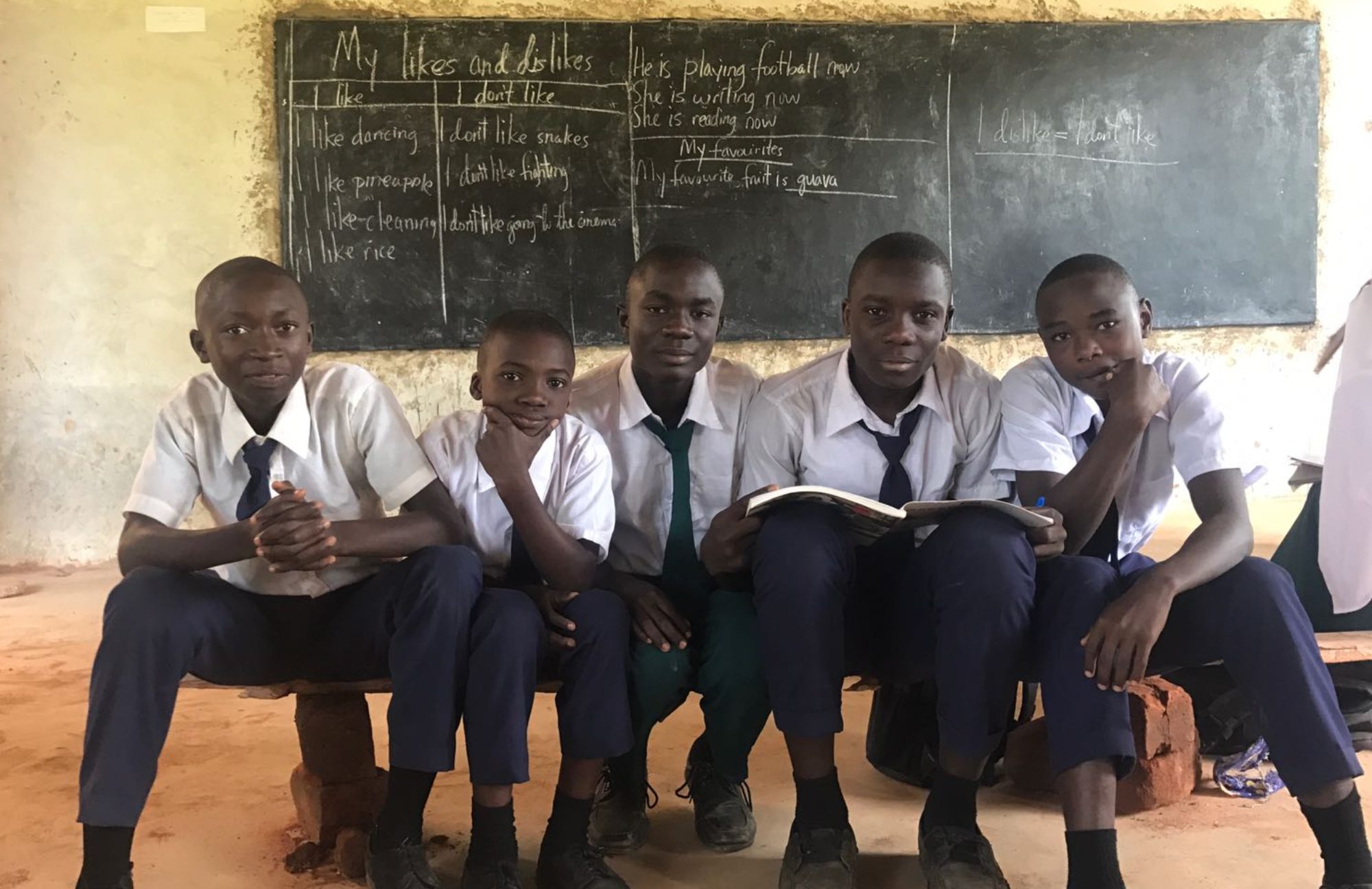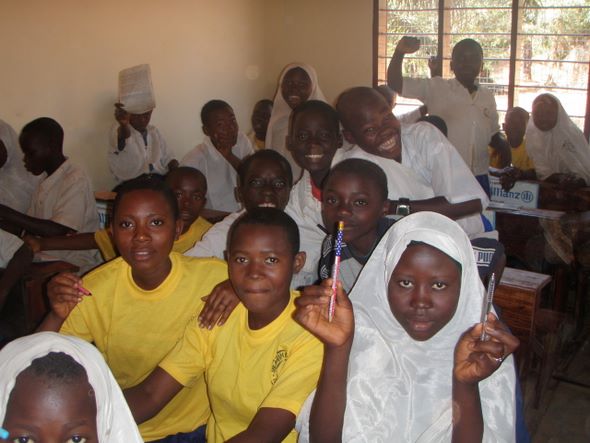A few days ago, I wandered through Mgaraganza village with Lucas and a couple of friends. Those of you who know her will laugh to hear that Rebecca (Becky) Burton is here in Kiganza, TZ living at GOSESO as I did three years ago! She worked with the Salt Lake Film Center and we collaborated on a Burundi film project a while back. I gave my business card to Shujie, another girl staying at GOSESO and when Becky saw it, she was in disbelief – just as I was when I got her subsequent email saying she was here.
Anyway, Shujie, Becky, Lucas and I were walking to see the building site for Amahoro Secondary School and we passed Mgaraganza Primary School. I remembered that I needed to set up a meeting with a standard 6 teacher to discuss visiting with letters I brought from Cassi Lanie’s second grade class at McGillis School in Salt Lake City, UT. I had visited Cassi’s class back in February when they were studying Africa. Hadley Rampton and I visited with slides about animals, homes, language, school and family in Tanzania plus some information about our upcoming summer project in Mgaraganza. After our chat with the students, they wrote letters for students in Mgaraganza.
The headmaster was very happy to see us and vaguely remembered me from my visit in 2008. It was cool to flip back in the visitor registry and see my name alongside Heather, Tamrika and Dagny – from a time we visited with Yared. We signed the book again and talked about Amahoro Secondary School and the penpal letters. I met the S6 teacher and he welcomed me to return.
The next day, Lucas and I returned with 12 letters from Salt Lake City. The students were uber eager to hear me speak English, although Lucas had to interpret the majority of what I said. Even though these students are only two years from entering secondary school (which is taught primarily in English), their English was quite poor. Primary School is taught through the medium of Kiswahili with one period devoted to English class.
Unfortunately, my eyes are always opened to the plight of children here as a result of a weak educational system. Among many problems are the following: students rarely have text books for their subjects; many don’t have pencils/pens/notebooks; many can’t afford uniforms and are thereby sent home; most of them come to school hungry; many teachers just up and leave midday for various reasons; some teachers drink on their breaks (insider information); many teachers are so poorly trained that their teaching is abysmal; many teachers don’t speak enough English to have a basic conversation with me, let alone teach it to their students. I hate to report the ugly truth, but I should be honest about the situation here.
Fortunately (or not), the examination process is (mostly) well-regulated and students who don’t pass the exams, don’t go to secondary school. A big component of those exams is English proficiency as much of the exam is in English. Imagine never really being taught English in primary school and then having to take an exam in English. So, those who do pass and can go to secondary school will hopefully fare well given that they understand English enough to learn in their classes. Unfortunately, many of those who pass won’t be able to go because unlike primary school, secondary school is not free – so no money, no education. That’s why Project Wezesha also has a small scholarship program. We only help about a dozen students, but it’s a start and it’s 12 more youngsters given a sliver of a chance.
But enough of the dark side. I invited students to come up and read each letter. Some of them read quite well and loudly enough for the class of 64 students (yes, 64 students to one teacher – a teacher, incidentally, who left before I arrived to ‘take care of some problem to the home’). Others didn’t read so well and I repeated the letters aloud for the class. As we read each letter, I wrote details on the board – the names of the students who wrote the letters, things they liked (football, pizza, skiing), sports teams they mentioned (Utes, Jazz) and other cute information, like the name of a student’s dog – Ziggy. So from Sam, Caroline, Andrew, Reuben, Jake, Ella, Izabella, Elisabeth and more, greetings and wishes were shared with this huge class. The young Salt Lake students expressed their desire to meet these students, their requests for replies, their hopes and dreams – to become Olympic skiers, play soccer with the Tanzanian kids, travel to Africa, etc.
After we read all the letters, the students wrote back. I had mentioned on a quick visit the day before that I would return and I suggested they think of something to write. To my surprise, many of them finished their letters the day before and only wished to transfer the writing to a new, neat page. I was happy to read the first few letters – saying ‘Thank you’, introducing themselves, discussing their family and their animals. I saw some students were struggling, so I wrote a sample letter on the board with basic information they might include. I realized after collecting the 6th or 7th finished letter that there was a strange pattern in the content…. Each student had two brothers and three sisters, a father who was a peasant farmer and a good goat (or dog) or combination with a slash between each … very much resembling the ‘options’ in an exercise book. As I wandered around, I saw that they were pretty much all writing the same letter. I started to ask a few of them directed questions about their family and helped them make some changes – such as correcting the number of siblings they have. I should have known when I saw that first letter saying they have a good dog at home. No one has dogs at home here! Haha! The letter pictured here is one of the few original letters.
Well, aside from the fact that most of the letters weren’t really representative of their true lives, they all wrote one and signed their real names, making sure to include Mgaraganza Primary’s address for a reply message. Hopefully, the kids at McGillis School will continue to correspond. After the letters were written, the students sang a couple of songs for the students which I recorded to share with the former 2nd graders and others who may wish to see the students. Lucas stepped in and led them in a Kihaa song (Kihaa is the local tribal language). It was so great to see Lucas step up and make that suggestion and then walk up and down the isles clapping and singing the lines so that they could repeat after him. Then, after singing he went over the meaning of the song with them – which basically reinforced the importance of education and studying to avoid poverty and welcome a better life. Make sure to watch the video and see Lucas’ big smile at the end! (oops, video upload problem … coming soon)
Finally, I delivered one pencil to each student as the McGillis School kids had wished. The video below shows them priding on their pencils, and while they seem as amped about these pencils as an American child would be with an iPad, they were really just psyched to be in the video. They were thrilled about the pencils – whooped and clapped when I said I had one for each, but I don’t want their enthusiasm in this video to mislead and imply that they have so little that a pencil made their year – but I bet it made their day!

